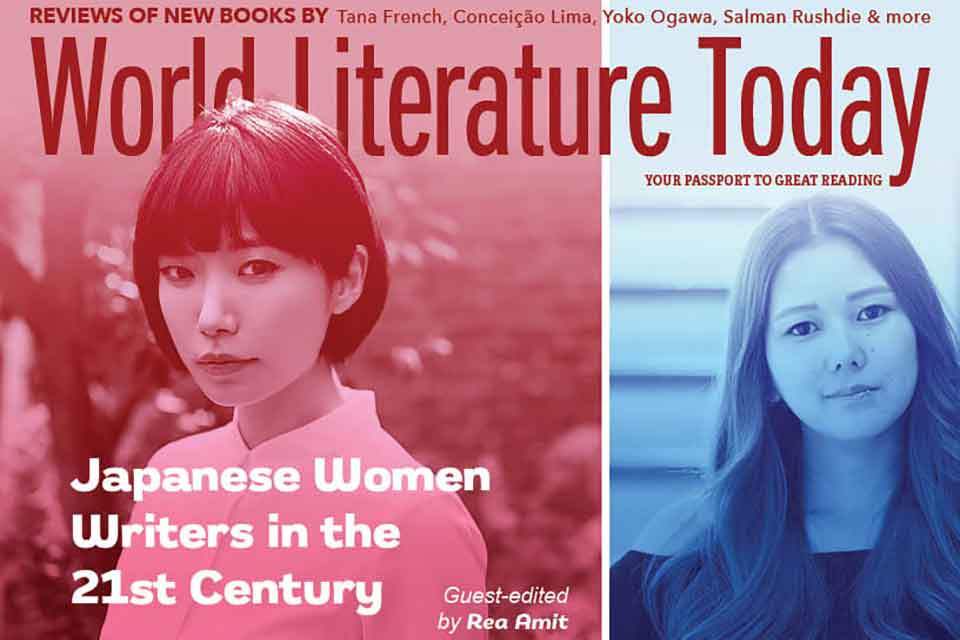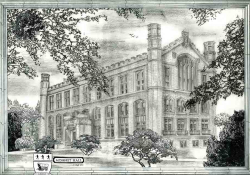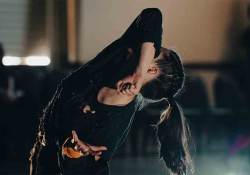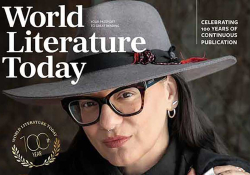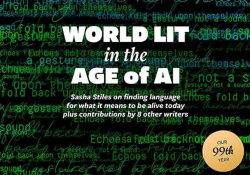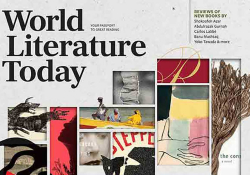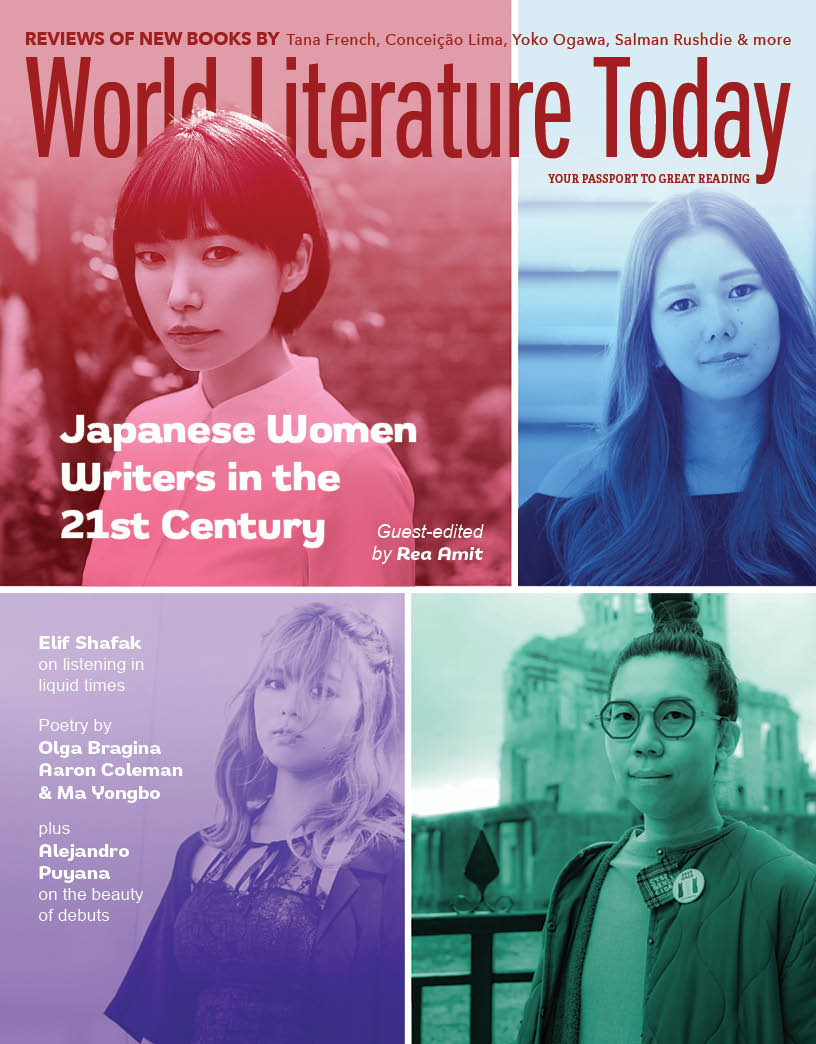Editor’s Note
 “Japanese Women Writers in the Twenty-First Century,” which headlines the current issue of World Literature Today, manifests the magazine’s long-running interest in modern literature from Japan. Just five years after the quarterly’s founding in 1927, an essay entitled “Mystery Stories East and West” appeared in these pages. The author, Ken Nakazawa (1886?–1953), was the first professor of Japanese descent at a major US institution (the University of Southern California) and also worked for the Japanese consulate in Los Angeles prior to World War II. Arrested on December 7, 1941, just hours after the Imperial Japanese Navy bombed Pearl Harbor, Nakazawa was placed in detention on Los Angeles’s Terminal Island, interned with his wife at Fort Missoula’s so-called Alien Detention Center, then later repatriated to Japan as part of a prisoner exchange between the US and Japan. Nakazawa’s Amerika gokuchū yori doho ni tsugu (Appeal to my compatriots from an American prison), considered the first published internment memoir, appeared in Japan in 1943, even as the United States’ Manhattan Project was already developing the nuclear weapons that would lay waste to Hiroshima and Nagasaki in 1945.
“Japanese Women Writers in the Twenty-First Century,” which headlines the current issue of World Literature Today, manifests the magazine’s long-running interest in modern literature from Japan. Just five years after the quarterly’s founding in 1927, an essay entitled “Mystery Stories East and West” appeared in these pages. The author, Ken Nakazawa (1886?–1953), was the first professor of Japanese descent at a major US institution (the University of Southern California) and also worked for the Japanese consulate in Los Angeles prior to World War II. Arrested on December 7, 1941, just hours after the Imperial Japanese Navy bombed Pearl Harbor, Nakazawa was placed in detention on Los Angeles’s Terminal Island, interned with his wife at Fort Missoula’s so-called Alien Detention Center, then later repatriated to Japan as part of a prisoner exchange between the US and Japan. Nakazawa’s Amerika gokuchū yori doho ni tsugu (Appeal to my compatriots from an American prison), considered the first published internment memoir, appeared in Japan in 1943, even as the United States’ Manhattan Project was already developing the nuclear weapons that would lay waste to Hiroshima and Nagasaki in 1945.
After the war, Ryūtarō Katō’s 1954 “Modern Japanese Literature” essay was part of a landmark series of national literary surveys that commemorated Books Abroad’s silver anniversary, marking the first quarter century (1927–52) of the publication’s existence. Yoshiyuki Iwamoto’s “Contemporary Japanese Fiction since 1960” (1962) and David Goodman’s 1972 essay on the playwrights Kunio Shimizu and Minoru Betsuyaku (“The Japanese Absurd”) marked additional high points of the postwar era. In WLT’s Summer 1988 issue devoted to contemporary Japanese literature, more than a dozen essays by and about such writers as Kenzaburō Ōe, Yasunari Kawabata, Fumiko Enchi, Yoshikichi Furui, Takeshi Kaikō, and Gōzō Yoshimasu were paired with articles on women writers, poetry, theater, and “Japanese Atomic-Bomb Literature.” After Ōe was awarded the Nobel Prize in 1994, he visited the University of Oklahoma in 2001 as that year’s Puterbaugh Fellow. WLT’s Winter 2002 issue featured Ōe against the backdrop of an Oklahoma redbud tree, with a portfolio inside devoted to his life and work.
In the special section that begins here on page 43, guest editor Rea Amit frames the dossier’s focus on contemporary women writers by highlighting the “integral role” female authors have played, since the nineteenth century, in the development of modern Japanese literature. In the late twentieth century, Amit writes, “Japanese women writers emerged with a heightened urgency to depict life from an unabashedly and unapologetically female perspective,” and these writers “continue to uphold and revitalize the written word” in the twenty-first. In the texts that follow, readers will encounter “Love All,” a playful fictional excerpt by Coreco Hibino (b. 2003), translated by David Boyd; Amit’s interview with Hiroko Oyamada (b. 1983); and Allison L. McClung’s essay “Breaking Gendered Expectations in Japanese Lit,” which highlights the work of writers Mieko Kawakami (b. 1976) and Hitomi Kanehara (b. 1983). Not to be missed, Amit’s “top ten” list (expanded to thirty-four titles in the online edition)—with its focus on fiction by women writers translated into English over the past twenty years—rounds out the section.*
In her 1988 article “Double Weave: The Fabric of Japanese Women’s Writing,” Amy Vladeck Heinrich writes about the “dual heritage” of Japanese literature—both Eastern and Western—arguing that “the real flowering of a renewed, vibrant women’s literature has been a postwar phenomenon” (WLT, Summer 1988, 409–10). Such continuing vibrancy is everywhere apparent in the work by the contemporary women writers featured in the current issue of WLT. As the “double weave” of both East and West offers ever more intricate and unique patterns, we hope readers will find many exciting discoveries in the pages that follow.
Daniel Simon
* J. Madison Davis included Seichō Matsumoto’s 1957 noir classic, Ten to sen, in a tentative top ten list of all-time greatest crime novels (WLT, Jan. 2006, 6–8). The book was recently retranslated as Tokyo Express (2023) by Jesse Kirkwood.
